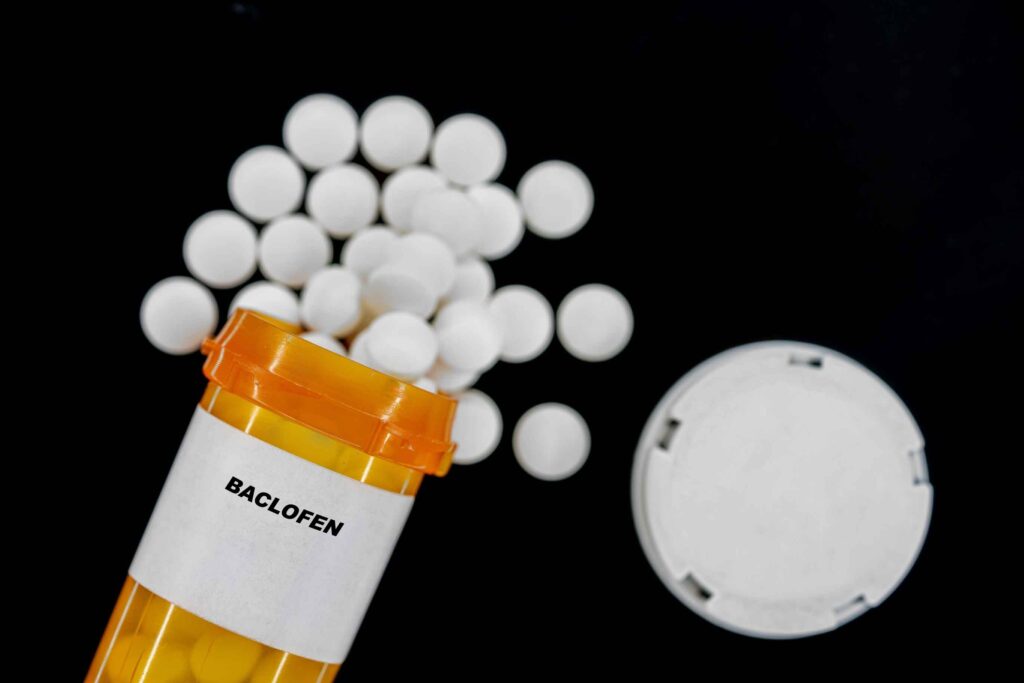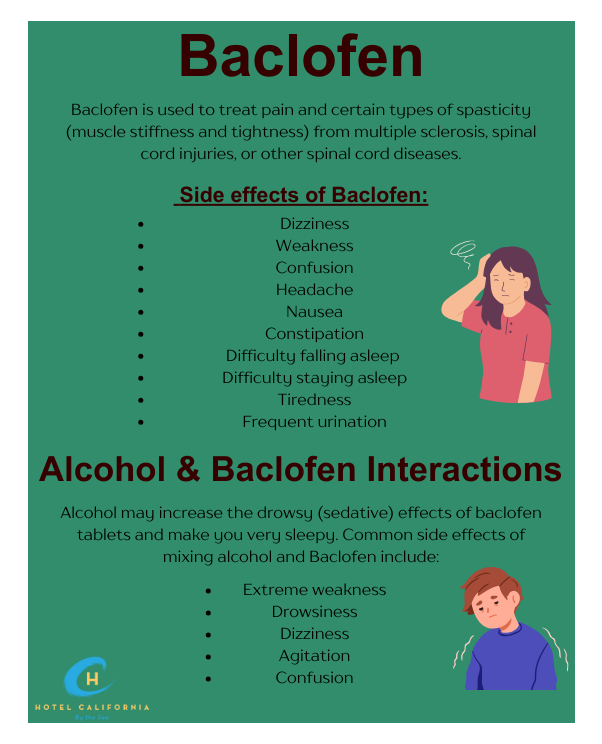Polysubstance Use: Baclofen and Alcohol
Baclofen is a prescription medication used to treat muscle spasms. It falls under the category of muscle relaxant. Baclofen specifically is FDA-approved for managing muscle spasms and reversible spasticity. It helps to provide relief for conditions such as flexor spasms, pain from multiple sclerosis, and concomitant pain. Baclofen is a central nervous system depressant, which slows down the activity of the brain and body. When taken with other depressant substances such as alcohol, it can cause extreme sedation and lead to dangerous adverse effects.

Baclofen is a selective gamma amino butyric acid-B (GABA-B) receptor agonist. The drug interacts with this neurotransmitter to inhibit the central nervous system and produce feelings of relaxation and sedation. The drug was initially designed in 1960 to treat symptoms of epilepsy. However, it was then reintroduced to treat muscle spasms and other similar conditions. Baclofen usually comes in a liquid injectable form and works by blocking pain signals in the body while at the same time producing feelings of relaxation to provide relief from symptoms.
When taken in low and normal doses of Baclofen, the drug can cause side effects such as drowsiness, dizziness, weakness and fatigue. When taken in high doses, side effects include slow and shallow breathing, sleep apnea, seizures, mental confusion, delirium, severe mood disorders and coma. Other common side effects of Baclofen misuse include sedation, hypotension, tremors, depression, agitation, speech alterations, vertigo and nausea.
The muscle relaxant has also been prescribed for a number of off-label uses. Recently, Baclofen has been prescribed to treat gastroesophageal reflux disease, to treat short-term treatment of spasticity, to help manage alcoholic liver disease, to treat alcohol-related anxiety and to help maintain alcohol abstinence by decreasing alcohol cravings. There is still very limited data showing the impact of Baclofen on the treatment of alcohol use disorder conditions.
The relationship between Baclofen and Alcohol
Both Baclofen and alcohol are central nervous system depressants and both interact with the GABA neurotransmitter to produce sedative effects. Combining two depressant substances can result in severe sedation. Some people take both Baclofen and alcohol together in an attempt to intensify the feelings of relaxation and achieve sedation.
Common side effects that occur with the polysubstance use of Baclofen and alcohol include extreme weakness, tiredness, drowsiness, dizziness, agitation, confusion, impaired judgment and impaired motor movement. Users can also experience slowed breathing, memory impairment, increased risk of seizures and an increased risk of overdose.
When these two sedative drugs interact, they compound the effects and impact on your body. It can slow down functions of the brain, it can slow down your heart rate and it can even slow down your breathing to the point where it is possible you stop breathing. Both substances can be addictive on their own. When used together, there is a higher risk of developing a dependence and addiction.

Recently, Baclofen has been used in alcohol use disorder treatment. Alcohol use disorder is a major public health problem. Alcohol is one of the world’s most accessible mind-altering substances, which in turn has also made alcohol use disorder one of the most common mental health conditions worldwide. It produces high rates of mortality. According to the Substance Abuse and Mental Health Services Administration, an estimated 15.6 billion people in the US meet the criteria for alcohol abuse or some sort of alcohol dependence.
Using Baclofen as part of treatment for alcohol use disorder is still new and quite controversial. In 2016, research found that the muscle relaxant could help reduce cravings among users with poor motivation to stop drinking. A 2021 clinical trial found that Baclofen could even help increase days of abstinence and help decrease patterns of heavy drinking. More clinical providers are recommending the use of Baclofen for treating symptoms of alcohol use disorder because studies have found that the drug mimics the effects of alcohol on a specific type of receptor in the brain.
However, despite a few promising studies, there is not nearly enough clinical evidence and research to support the benefits of Baclofen in treating other aspects of alcohol use disorder. Some more recent studies recommend not using Baclofen as the first line of treatment for alcohol withdrawal.
Check Your Insurance Coverage for FREE
Find out if your insurance covers addiction treatment in minutes. We accept most insurance!
What are Central Nervous System Depressants?
Both Baclofen and alcohol and central nervous system (CNS) depressants. Central nervous system depressants are drugs that slow down brain activity. This can be very effective in the treatment of many types of health conditions. They work by impacting the GABA neurotransmitters and produce side effects such as drowsiness, relaxation and decreased inhibition. Central nervous system depressants are often prescribed to treat conditions such as insomnia, anxiety, panic attacks, stress, sleep disorders, pain and seizure disorders.
There are three major types of CNS depressants: sedatives, hypnotics and tranquilizers. Some of the most common ones include alcohol, benzodiazepines, opioids, sleep pills and muscle relaxants. All depressant drugs have the potential to become addictive. Because of this, it is recommended to gradually taper off the medication to avoid uncomfortable and painful withdrawal symptoms.
What are Muscle Relaxants?
Muscle relaxants such as Baclofen treat muscle spasms by relaxing your muscles to help reduce stiffness and pain. There are two main types of muscle relaxants. Central-acting muscle relaxants block the signals sent between the brain and the spinal cord. It is typically prescribed to treat pain, stiffness and spasms. Examples of this include Valium, Baclofen and Carisoprodol.
Peripheral-acting muscle relaxants affect the muscle directly and work to reduce physical muscle contractions by interfering with body motor control. It is used to treat conditions such as spasticity. An example of this medication is Dantrolene.
Muscle relaxants are often used by athletes and those who have physical conditions in which they experience muscle pain. Other people abuse the drugs for the sedative effects. Because muscle relaxants such as Baclofen interact with the CNS, it is important to take the medication under the care and monitoring of a clinical and medical professional. This helps better ensure the safety and efficacy of the drug treatment
Reach out to Hotel California by the Sea
We specialize in treating addiction and other co-occurring disorders, such as PTSD. Our Admissions specialists are available to walk you through the best options for treating your addiction.
Do you need treatment for Polysubstance Abuse?
How do you know if you have a substance use disorder or polysubstance use disorder?
- You mix alcohol with prescription medication to enhance the effects of the drugs
- You drink alcohol with prescription medication even though you know you’re not supposed to
- You suffer from alcohol withdrawal when you try not to drink
- You overlook the long-term effects of alcohol use when combined with medications such as muscle relaxants
- You experience a loss of motor skills due to alcohol and medication use
The polydrug use of Baclofen and alcohol can result in a higher risk of overdose and alcohol poisoning. It can enhance the effects of both drugs and cause respiratory depression and coma. Treatment for substance use disorders and polydrug use can be effectively treated through a behavioral health treatment program such as Hotel California by the Sea.
We provide varying levels of care including drug detox, alcohol detox, residential treatments and outpatient treatment programs. Clients will also engage in evidence-based treatment methods such as CBT, DBT and group therapy to address any co-occurring mental health disorders that may also be present. Hotel California by the Sea is dedicated to helping our clients in every stage of their recovery by addressing the physical, psychological and emotional aspects of addiction.
References:
https://www.ncbi.nlm.nih.gov/books/NBK526037
https://www.ncbi.nlm.nih.gov/pmc/articles/PMC6328471
https://www.ncbi.nlm.nih.gov/pmc/articles/PMC2626149
https://www.medicalnewstoday.com/articles/baclofen-and-alcohol
https://www.addictioncenter.com/drugs/drug-classifications/central-nervous-system-depressants
https://www.healthline.com/health/muscle-relaxers-and-alcohol
https://zinniahealth.com/substance-use/alcohol/with-muscle-relaxers
